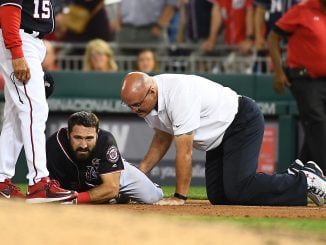
Being a part of the Topsail High baseball team was probably the best thing happened to Alex Postma this school year.
Until it became the worst thing that happened to him.
The Pender County teenager, who despite being intellectually gifted is considered disabled because of a severe anxiety and depression condition, became the center of a controversy earlier this month when he was unexpectedly ruled ineligible for competition.
His change of status forced his team to forfeit all but one of its 17 wins and cost it a spot in the 3A state playoffs.
It’s a decision that has brought about two separate investigations to date and sparked a variety of emotions, ranging from disappointment to outrage to disbelief, throughout the Topsail community and beyond.
According to Postma’s father, the situation has done considerably more damage than just the premature end to an otherwise successful season.
“Alex usually struggles this time of the year anyway, and with this on top of it, it doesn’t help,” Michael Postma said of his son, a senior. “We’re trying to get him through to graduate, but he’s been sleeping a lot and not being very productive. We’re kind of just pushing him to the finish line and hoping he can get through it.”
Complicating matters for the Postma family and others connected with the Pirates’ baseball program is that no one — including those who made the decision — seems quite sure why Alex was ruled ineligible.
A meeting between Alex’s mother, Julie Postma, and Topsail principal Berry Simmons the day after the ruling provided little clarity. The family is hoping that a scheduled meeting with Pender County School Superintendent Steven Hill on Wednesday will help them gain a better understanding of the situation.
But Michael Postma isn’t optimistic.
“Hopefully we’ll get a little more of an explanation there,” he said. “Quite frankly, I don’t think even (Hill) knows all the facts. … We really don’t know what’s going on behind the scenes. We suspect it’s not just about Alex. We think there’s something more going on.”
The elder Postma believes his son’s problems can be traced to a “crash” Alex experienced early in the school year that caused him to fall behind in his coursework and — despite a move to an online program — ultimately drop two of those classes.
“The anxiety hits him, and cognitively he cannot function very well,” said Michael Postma, a former teacher and school administrator who has worked extensively with twice-exceptional children such as his own. “It’s hard to even get him out of bed. He internalizes, then he starts spiraling negatively. Even the simplest of tasks become very difficult. He reasons his way out of them in his own mind.”
Michael Postma said his son has suffered from numerous such episodes. What made this one different from the others was baseball.
“In mid-November, he really made the decision to get competitive again, because he’d been out of baseball for three years, and he knew he needed to get in shape and get back in the game,” Michael Postma said. “We started practicing, and he was working out almost daily. It was quite courageous that he went out for the team. I didn’t think he would do it.”
Alex didn’t just try out for the team. He was actually chosen to become a member of it.
It’s a position his father said he earned, despite a characterization in the media since the controversy came to light that his son was only taken on the team because of his disability.
“He’s been made out to be some kind of charity case. He’s not,” Michael Postma said. “He made the team on his merit. The coaches and players had no idea what he was dealing with, and he’s a good ballplayer. He made the team, and we were thrilled.”
So was Alex.
Although he saw only limited action for the Pirates, batting three times with one RBI while making most of his contributions as a courtesy runner, the experience of playing, practicing and simply being a member of the team was therapeutic for the usually noncommunicative young player.
“This was a new Alex we were seeing, because he loves baseball.” his father said. “When he was playing ball, working out, he was in there cheering. He was talking to the boys and had become fairly close. That’s a huge thing for a kid like that.”
Then, in the blink of an eye, it all came to an end.
The ruling likely stems from those two online classes Alex wasn’t able to finish during the fall semester. If so, the problem should have been caught before the season ever started.
But when coach Aaron Rimer submitted his roster to athletic director Barry West for approval, all members of the team — including Alex — were certified as eligible.
School and school system officials have declined comment on the matter, other than to issue a press release from Pender County Schools spokesperson Miranda Ferguson acknowledging that am eligibility violation had occurred and that the system “is reviewing all athletic procedures and making every effort to ensure there are no further violations.”
“It’s frustrating,” Michael Postma said. “I think the worst piece is that the entire team got penalized for something that no one really quite quantified until late in the game.”
The forfeits and playoff disqualification were a devastating blow to a team that had a legitimate shot at winning a state championship.
As heart-wrenching as the decision was, the rest of the players on the squad have remained solidly behind Alex.
“The kid didn’t even know he was ineligible,” senior Colby Emmertz told a local Wilmington television station shortly after the ruling was announced. “It wasn’t his fault.”
That’s a sentiment most of Alex’s teammates have expressed to him via text.
His father said the messages have meant a lot to his son, even though it might take a while for him to respond to them.
“He needs time to process this all,” Michael Postma said. “I think in a few weeks, he’ll come around again. They’ve told him this is not his fault and they still support him. I think that’s important for him to understand, but this still a burden on him.”




